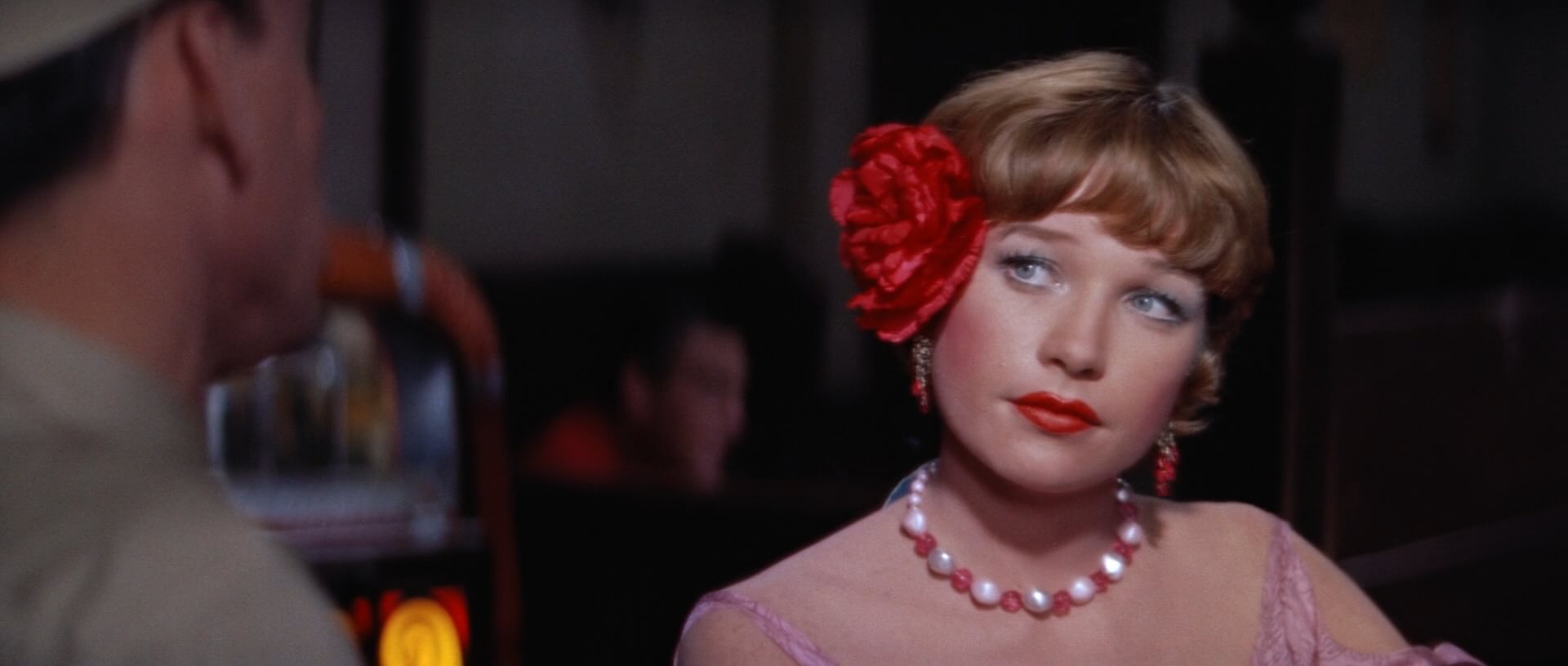A single gesture, in a film that cuts, should suggest the whole. And so it is with Shirley MacLaine’s jab at her heart when she starts to say, “I don’t got nothin’…”, inside a Vincente Minnelli-designed classroom in Some Came Running (1958). Even now, I dip and melt thinking of Shirley’s jab, which—true to Minnellian form—erupts from an inner cauldron of innocence, grace, and all-too-knowing terror. At a school, Miss Ginny Moorehead (MacLaine), a romantic, confronts Gwen French (Martha Hyer), a bourgeois schoolteacher, over a man that she, the romantic, loves. The teacher is loved—or so she thinks—by the same man (Frank Sinatra); and the man, a failed writer, loves her—or so he thinks. But Miss Morehead knows. She knows her heart and she knows the man’s. She don’t got nothin’ but it: not the love of knowledge, but knowledge-love. “It,” as it floats unpindownable in the fantastic, dance-prone sets of Minnelli, is, for brief seconds, love—an explosive dream, the burst into movement, whether Judy Holliday dance or hand-heart-jab—and then, finally a desire, sadly, to be beyond what we feel, hazily, is reality.
A familiar scene: Shirley MacLaine weeps over the fact that she wishes Sinatra loved her the way she loves Sinatra. “He touches me, and I—f-f-fall apart.” After her choked-back sob, Martha Hyer consoles Shirley with typical, flat, logical words: “Consequently, I am not your rival.” Shirley is relieved. Surrounded by Poe quotes on the teacher’s chalkboard, in one of those quintessential Minnellian rooms shot in CinemaScope that stretches to a punishment of emptiness, the romantic is relieved, wavering between past, present, and future tense. “Oh, Miss French,” Shirley says. “You don’t know how scared I was. ‘Cause I knowed you could take him away from me if you want to. ‘Cause I ain’t rich or smart like you. I don’t got nothin’…” And then: Shirley’s heart-jab. More than a shocking synecdoche for the phrase “but love,” it’s a jab that conveys the weight of pain and experience in sharper gestures than could have ever been written. Makes sense for Minnelli, an elegant man of few words with a pronounced stammer. The spoken and written language forms us, but it is our actions—loud, impulsive, sprung from the unconscious—that leave their lingering bruise.
Some Came Running is a heady mix of Greek tragedy, indulgent Americana, and a melancholic attack on the family values that keep towns and minds provincial. Beyond this, it builds over 135 perfect minutes to show our essential helplessness when faced with the cruel depth of our emotions, our inability to intelligently cope with forces outside our control. I could pore through every scene of Some Came Running and direct the eye to moments like Shirley’s hand-jab, for time and again Minnelli cultivated myriads of such stupor-inducing moments. Ms. French, regal teacher, admits that she would have been “repelled” by Poe, but would have “tried to understand him.” False! Minnelli has placed Shirley MacLaine, a modern Poe of sorts (she lives by the principle of the poetic pare-down), right before her very eyes—and Miss French is naïvely ignorant to the status of this resurrection. Sad! But isn’t that our lot? Ignorance of the hand-jab—which, too, is a word. Her love, a brooding and hatefully unemotive Man-writer trying desperately to prove he exists, does not speak the poet’s language; he will become a recognized writer, but it will come at a tragic price. He will be shut off to Poe, to poetry. Shirley’s Ginny Moorehead, with her child-like bunny purse, was taught by Romance, just as Poe claimed Romance “Taught me my alphabet to say— / To lisp my very earliest word / While in the wild hood I did lie, / A child—with a most knowing eye.”
Some Came Running screens on a double bill with Bells are Ringing, both on 35mm, August 22 - 25 at the Stanford Theatre as part of the series “Directed by Vincente Minelli.”






